Current News
/ArcaMax

Employers press Congress to cement health price transparency before Trump's return
It seems simple: Require hospitals and insurers to post their negotiated prices for most health care services and — bingo — competition follows, yielding lower costs for consumers.
But nearly four years after the first Trump administration’s regulations forced hospitals to post massive amounts of pricing information online, the effect on ...Read more

Immigration drives nation's population growth
A recent immigration surge brought newcomers to every state this year, helping to offset a continued drop in U.S. births while contributing to a national upswing of about 3.3 million new residents, according to new U.S. Census Bureau estimates.
Texas and Florida continued to dominate state population growth, together adding more than 1 million ...Read more
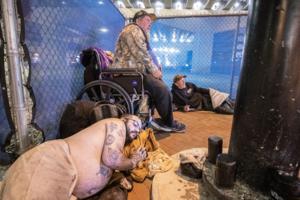
Will new year, new law bring new trouble for Orlando's homeless?
ORLANDO, Fla. — A sliver of pavement under an I-4 overpass is the place a half dozen unsheltered men call home.
They sleep in a group to look out for each other’s safety and ensure their few belongings aren’t stolen. Each night they arrive at sunset, and they usually are unbothered by law enforcement until about 5:45 a.m., when police ...Read more
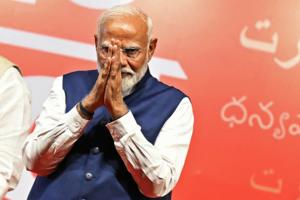
Modi's year of setbacks leaves India vulnerable in perilous 2025
NEW DELHI, India — At the outset of 2024, Prime Minister Narendra Modi was riding a wave of international acclaim and anticipating an election campaign that looked like such a formality he talked of a thousand-year legacy.
Now, he’s looking back at a year of setbacks — at the ballot box, on the economy, in relations with foreign partners ...Read more

Can Cuba and Venezuela help rescue Haiti? Head of US-backed transition is asking
MIAMI — In Cuba the population is fighting shortages of food, fuel and medicine while a collapsing electrical grid that resulted in three nationwide blackouts this year continues to leave many people in the dark.
In Venezuela, strongman Nicolás Maduro is driving the hemisphere’s worst migration crisis — nearly 6 million people have fled ...Read more

Why retiring Sen. Debbie Stabenow still believes in the 'win-win'
WASHINGTON — Washington is full of people who obsess about the daily news cycle and who is “winning” it. But looking back on her 24 years in the Senate and nearly half a century in politics, Sen. Debbie Stabenow said it doesn’t have to be that way.
“It’s not about making sure the other side loses, and that’s just too much of what ...Read more
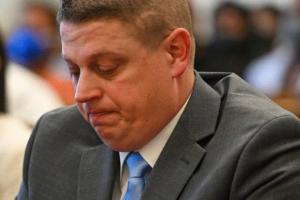
Missouri governor frees Eric DeValkenaere, first Kansas City cop convicted of killing a Black man
KANSAS CITY, Mo. — Missouri Gov. Mike Parson on Friday commuted the prison sentence of former Kansas City police Detective Eric DeValkenaere, the first Kansas City officer ever convicted of killing a Black man, an explosive decision that will infuriate residents and risk damaging the state’s relationship with the city.
Parson announced the ...Read more

'A horrible message': Kansas City ex-cop's clemency expected to hurt trust of police
KANSAS CITY, Mo. — More than a year ago, Jackson County Prosecutor Jean Peters Baker warned Missouri Gov. Mike Parson that pardoning former Kansas City police Detective Eric DeValkenaere, the city’s first officer ever convicted of killing a Black man, would fuel distrust in the public safety system.
Parson’s chief of staff at the time ...Read more
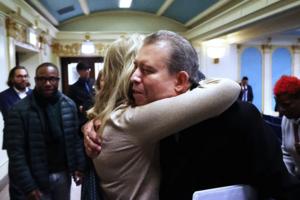
Chicago Board of Education votes unanimously to fire schools chief Pedro Martinez
CHICAGO — Mayor Brandon Johnson’s Chicago Board of Education voted unanimously Friday to fire Chicago Public Schools Chief Executive Officer Pedro Martinez, clearing the way for the mayor to install a new leader for the nation’s fourth-largest school district after a monthslong power struggle.
After a closed-door session, the seven-member...Read more
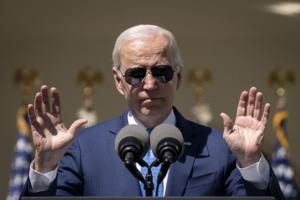
Biden gets record 235th federal judge confirmed in waning days
WASHINGTON — President Joe Biden set a new record for federal judicial confirmations in a single term, when Serena Murillo became his 235th life-tenured federal judge confirmed by the U.S. Senate as lawmakers worked into the night ahead of a holiday break.
The confirmation on Friday night means that approximately one quarter of all active ...Read more

Luigi Mangione's 15-day path from New York to Altoona McDonald's
NEW YORK — Stepping out of the Port Authority bus terminal late in the evening on Nov. 24, authorities say, Luigi Mangione took a taxi to the New York Hilton Midtown, where UnitedHealth Group Inc. planned its annual investor conference 10 days later.
Mangione then spent about an hour walking in the area of the sprawling hotel, which has ...Read more

Chicago Public Schools CEO goes to court in last-minute attempt to save job before board meeting
CHICAGO — Chicago Public Schools chief Pedro Martinez filed an injunction in Cook County Court and asked for a temporary restraining order to prevent the school board’s possible firing of him Friday night.
“The Board Member Defendants were appointed to do the bidding of the Mayor as well as the Chicago Teachers Union (‘CTU’), which ...Read more

Tensions brew over trans athletes at Southern California high school, as conservative protests grow
RIVERSIDE, Calif. — The debate over the rights of transgender athletes to compete in school sports intensified this week in the Inland Empire region of Southern California, as two Republican lawmakers called for the resignation of the Riverside Unified School District superintendent while LGBTQ+ advocates pleaded with the school board to "...Read more

Disgraced attorney Tom Girardi to surrender to federal prison for medical evaluation, judge rules
LOS ANGELES — The now disgraced and disbarred attorney Tom Girardi must surrender to federal authorities early next year for a medical evaluation at a federal prison in North Carolina, a judge ruled Friday.
The decision by U.S. District Judge Josephine Staton amounts to a procedural interlude after the 85-year-old Girardi was convicted of ...Read more

Trudeau government at risk of collapse as New Democratic Party pulls support
OTTAWA, Canada — A key former ally of Justin Trudeau’s said he would vote to topple the government, a move that would likely plunge the country into an election early next year unless the prime minister seeks a temporary suspension of parliament.
Jagmeet Singh, leader of the New Democratic Party, said in a public letter that he will put ...Read more
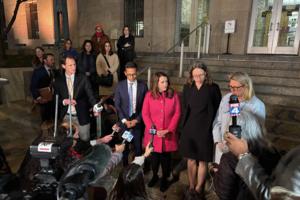
Missouri judge blocks some, not all, abortion restrictions. What that means for restoring access
KANSAS CITY, Mo. — A Missouri judge on Friday blocked a series of long-standing restrictions on abortion, but kept in place a licensing requirement that could delay providers from immediately restoring access to the procedure.
The decision from Jackson County Circuit Court Judge Jerri Zhang came after voters last month overturned the state’...Read more

Miami federal judge sets bond hearing on sex charges against Alexander brothers
MIAMI — After a week in state custody on rape charges, Alon and Oren Alexander made their first appearances in Miami federal court Friday afternoon to face charges of sex trafficking dozens of women over a decade in New York, South Florida and elsewhere.
The 37-year-old Miami Beach twins appeared before a magistrate judge, who set a bond ...Read more
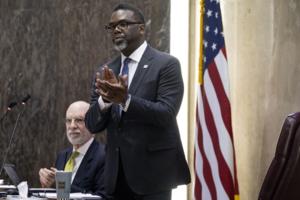
Chicago Mayor Brandon Johnson launches unified shelter system as migrant shelter population wanes
CHICAGO — Mayor Brandon Johnson moved ahead Friday on his plan to close Chicago’s migrant shelters and fold them into the city’s existing system for homeless residents.
The so-called “One Shelter” system will combine shelters that have long served the city’s homeless with several facilities launched to care for the more than 50,000 ...Read more

Trump's spy pick Gabbard faces a tricky climb for Senate backing
WASHINGTON — Tulsi Gabbard, President-elect Donald Trump’s nominee to oversee U.S. intelligence, toured Capitol Hill this week looking to reassure some Republican senators who have withheld their support so far and appeal to any Democrats who might be persuaded to back her.
Gabbard’s priorities as director of national intelligence, she ...Read more

Analysis: Europe, too, feels Musk's political impact. How far will it go?
In the six weeks since Donald Trump won the presidential election, Europe has been bracing for a U.S. administration that could strain traditional transatlantic alliances.
That sense of uncertainty has just been turbocharged by a disruptive new force: multibillionaire Elon Musk, who has made it clear he intends to leave his mark on politics ...Read more
Popular Stories
- Party of one? 'NostraThomas' Massie throws wrench in House GOP agenda before Trump takes office
- Florida county is vacating convictions of those who bought crack made at courthouse
- Don't buy your kids these items for Christmas, pediatricians say
- Why Trump's boast of newly found friends could prove fleeting
- California squirrels are now apparently hunting and eating other rodents





